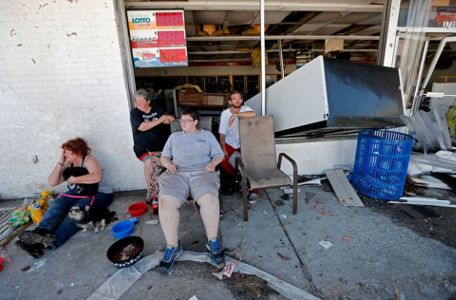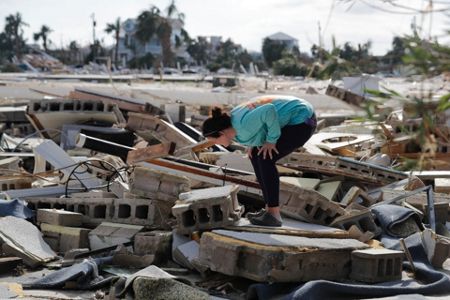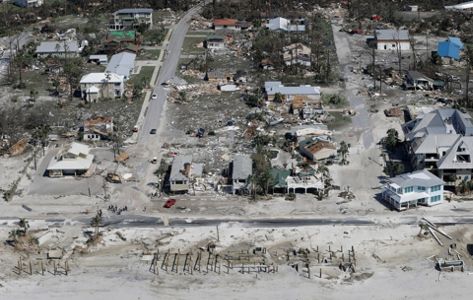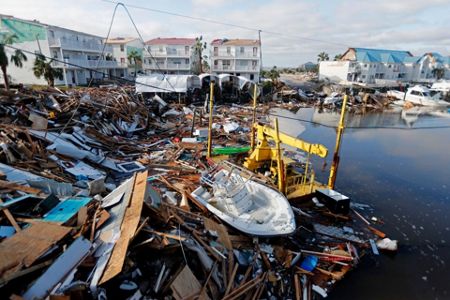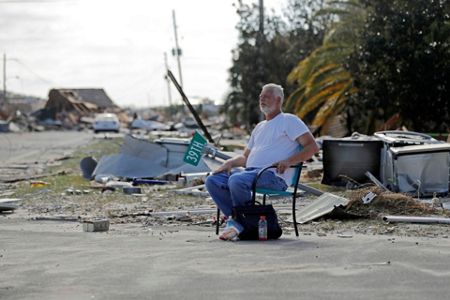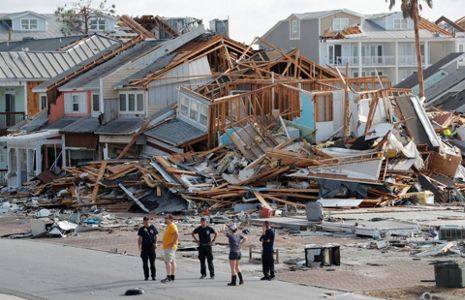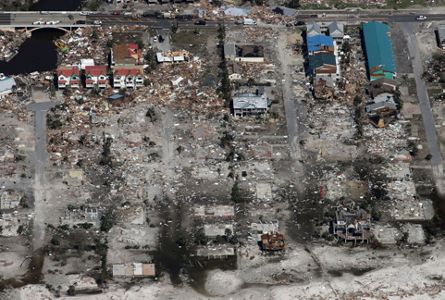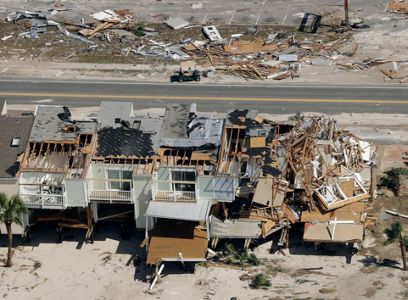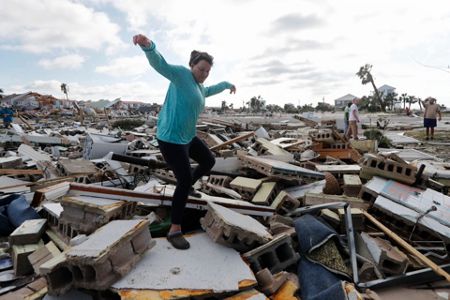MEXICO BEACH, Fla. (AP) — Residents of Mexico Beach that stayed during the storm are emerging from the debris with harrowing tales. Others, who evacuated, are coming to grips with the fact that much of their community was destroyed by Hurricane Michael.
Hit head-on by the storm, numerous homes in this Gulf Coast resort town of about 1,190 people were shattered or ripped from their foundations. Boats were tossed like toys. The streets closest to the water looked as if a bomb had gone off.
What the 9-foot (2.7-meter) storm surge didn't destroy, the 155 mph (250 kph) winds finished off.
Now, rescuers and residents are struggling to get into the ground-zero town to assess the damage and search for the hundreds of people believed to have stayed behind.
Linda Marquardt, 67, rode out the storm with her husband at their home in Mexico Beach. When the house filled with storm surge water, they fled upstairs.
"All of my furniture was floating," she said Thursday. "A river just started coming down the road. It was awful, and now there's just nothing left."
She said their home is full of mud.
"We'll have to bulldoze and start over."
Drone footage of Mexico Beach showed a stunning landscape of devastation. Few structures were unscathed.
John Humphress, a storm chaser and drone pilot, arrived around 5 p.m. Wednesday, a few hours after Michael slammed into the coastline. He had one word to describe what he saw: "apocalyptic."
State officials said 285 people in Mexico Beach had refused to leave ahead of the hurricane despite a mandatory evacuation order.
A National Guard team went into the area and found 20 survivors Wednesday night, and more crews pushed into the stricken zone on Thursday. The fate of many other residents was unknown, authorities said.
Dawn Vickers, her teenage son, and her mother, didn't evacuate. They were joined during the storm by a friend who lived on a houseboat. At one particularly violent point in the storm, Vickers looked out the window and thought a tree was moving — but it was really her house, ripped off the foundation.
It was floating in the storm surge.
An Associated Press reporter found Vickers and her family sitting next to a convenience store with blown-out windows Thursday.
"Our house would have probably been in the canal if it hadn't gotten caught on some trees that fell," said 17-year-old Ryder Vickers, adding that the home split in two, like an egg.
Once the water receded, they climbed out a window, onto another house and over a boat, but because Dawn Vickers' mother Patsy has a lung disease, they couldn't go far. The four spent the night in one half of the waterlogged home.
"I've never been so scared in my life," said Dawn Vickers. "We were all praying, 'Just please get us through this.' I thought we were going to die."
Mishelle McPherson and her ex-husband looked for the elderly mother of a friend on Thursday. The woman lived in a small cinderblock house about 150 yards (140 meters) from the Gulf and thought she would be OK.
Her home was reduced to crumbled blocks and pieces of floor tile.
"Aggy! Aggy!" McPherson yelled. The only sound that came back was the echo from the half-demolished building and the pounding of the surf.
"Do you think her body would be here? Do you think it would have floated away?" she asked.
As she walked down the street, McPherson pointed out pieces of what had been the woman's house: "That's the blade from her ceiling fan. That's her floor tile."
On Thursday, residents who evacuated tried to return.
The Rev. Eddie LaFountain, pastor at First Baptist Church in Mexico Beach, was one of them. He described the place as a "good family resort town" that attracts visitors seeking peace and quiet rather than the spring break-like atmosphere of other communities along the 200-mile (320-kilometer) Florida Panhandle.
More than a third of the population of Mexico Beach is 65 or older, according to the U.S. Census, and nearly half of the housing is for seasonal or recreational use.
Most of the full-time residents, LaFountain said, have some connection to the hospitality industry. Some operate vacation home rentals, while others work jobs cleaning and maintaining the homes. Others own or work in restaurants, rent out kayaks or run charter fishing boats. LaFountain himself has a lawn-mowing business.
Despite the widespread destruction, LaFountain said he believes most people will rebuild.
"I think the people here have a great heart and a lot of resilience. We call them stubborn and hard-headed. I think they will be back," LaFountain said in a phone interview while driving back to Mexico Beach.
Mexico Beach is on the west end of what is sometimes called Florida's Forgotten Coast, so named because it is not heavily developed like many of the state's other shoreline areas, with their lavish homes and high-rise condos and hotels.
U.S. Route 98 runs right along the coast, where a few beachside restaurants offer oysters and other seafood, cocktails and a view of the Gulf of Mexico.
Bob Tenbrunesel's home in Mexico Beach was damaged but not destroyed. On Thursday, he rode around town in the back of a pickup truck, surveying the damage. It was upsetting to see all of the places that he loved destroyed: Toucan's Bar and Grill, Killer Seafood, Cathey's Hardware and Tackle.
"This place will never be the same."
___
Tamara Lush reported from St. Petersburg, Florida; Brendan Farrington from Tallahassee, Florida; and Curt Anderson from Miami.
Copyright 2018 The Associated Press. All rights reserved. This material may not be published, broadcast, rewritten or redistributed.




